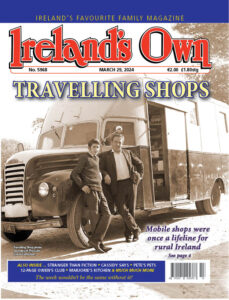Marie O’Connor recalls the days, before cars and supermarkets were ubiquitous, when travelling shops provided such a vital service to the families of rural Ireland.
“Thank God for home deliveries, what would we have done without them?” praised my friend, referring to her local supermarket dropping her groceries to her door during the Covid pandemic.
“It’s a wheel that has already been invented,” I pointed out, and went on to tell her how, many years ago, travelling shops drove through the highroads and byroads of the countryside selling their goods to their loyal customers at their homes.
They originated as far back as the 1940s when the mobile shop started with horsepower and a cart, before becoming motorised.
They served their purpose graciously until they began to become scarce in the 1990s.
I grew up in the countryside, five miles outside the town of Castlebar in Co. Mayo. Two different travelling shops called upon my mother once a week: Willie McHale from Ballyvary, and Adrian McEllin from Manulla.
Adrian’s father and mother; Tom and Sadie, ran a very efficient shop and yard. Tom saw a need for a travelling shop in his locality and bought a van in the late 1970s.
When Adrian was old enough to drive they bought a lorry and he took over the travelling shop and its then far-reaching established routes until the 1990s.
It was a hard job enduring long hours over five days a week but it left him with very fond memories which reflect on a rural Ireland almost unrecognisable today.
 The historical account of these mobile retailers provides us with a highly valuable and notable window into the way we lived our lives, and the particular commodities we purchased documented the lifestyles we had to adapt to within the limitations of our time.
The historical account of these mobile retailers provides us with a highly valuable and notable window into the way we lived our lives, and the particular commodities we purchased documented the lifestyles we had to adapt to within the limitations of our time.
This underestimated service was vital to so many rural communities. People did not know how to drive and besides, motorcars were scarce and expensive. Women in particular were isolated and access to their local towns and villages was limited due to rare or non-existent public transport, so reliance on this service was of the upmost importance.
At least once a week the visit of the mobile shop was highly anticipated. Much needed replenishments of essentials like tea, bread and sugar were required, never mind the indulgence of biscuits, sweets or jam – if such treats were even afforded.
When the opportunity did arise to go into town, the customers still left the purchase of heavier goods for the travelling shop such as flour, potatoes or washing power. Any weighty item when carried for a period of time can become challenging and cumbersome, especially when hanging from the handlebars of the bike!
Some travelling shops carried big bags of animal feed too as were required by the farming homesteads. However, food for man and beast were not the only commodities one could purchase; other necessities like shoe laces, batteries, soap and Jeyes Fluid were in high demand.
And then there were requests for items that one would find comical nowadays, but were practical requirements for times past – like hen rings and pig rings, for example.
Hen rings were coloured rubber rings put on the feet of hens so you could tell their age within the brood. Pig rings were inserted into the snout of a pig so they could be led or tied. Most houses had a piggery so there was plenty of bacon and eggs, sunny side up!
A lot of the required goods were prepped at base before being carried on the run.
Sometimes smaller bags of grains and seeds for animals were enough. Lots of people lived in caravans or makeshift homes on a permanent basis and they asked for smaller amounts of paraffin oil for their minimal living spaces.
Continue reading in this week’s Ireland’s Own


